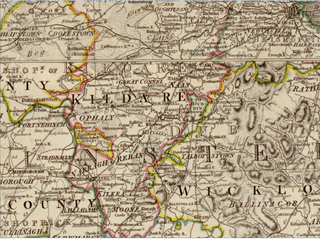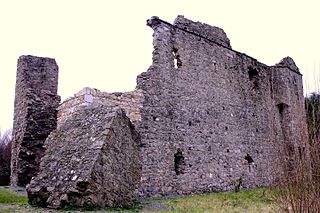Related Research Articles
The Lord High Chancellor of Ireland was the highest judicial office in Ireland until the establishment of the Irish Free State in 1922. From 1721 to the end of 1800, it was also the highest political office of the Irish Parliament: the Chancellor was Speaker of the Irish House of Lords. The Lord Chancellor was also Lord Keeper of the Great Seal of Ireland. In all three respects, the office mirrored the Lord High Chancellor of Great Britain.

William Vesey-FitzGerald, 2nd Baron FitzGerald and Vesey, was an Anglo-Irish statesman. A Tory, he served in the governments of Lord Wellington and Robert Peel, but is best known for his defeat in the 1828 Clare by-election, hastening Catholic Emancipation across Britain and Ireland.

The Barons of the Exchequer, or barones scaccarii, were the judges of the English court known as the Exchequer of Pleas. The Barons consisted of a Chief Baron of the Exchequer and several puisne (inferior) barons. When Robert Shute was appointed second baron in June 1579 the patent declared "he shall be reputed and be of the same order, rank, estimation, dignity and pre-eminence to all intents and purposes as any puisne judge of either of the two other courts." The rise of commercial trade in Elizabethan England occasioned fraudulent application of the Quo minus writ. More taxation demanded staff at the exchequer to sift an increase in the case load causing more widespread litigation cases to come to the court. From the 1580s onwards the Barons of Exchequer were no longer held in such low regard, and more likely to be Serjeants-at-law before qualification. The Inns of Courts began to exclude solicitors, and held posts for judges and barons open equally to barristers. In 1591, Regulations reflected a case in which the Lord Keeper Egerton banned solicitors from seeking cases in the Exchequer.

The Dean of St Patrick's Cathedral is the senior cleric of the Protestant St Patrick's Cathedral, Dublin, elected by the chapter of the cathedral. The office was created in 1219 or 1220, by one of several charters granted to the cathedral by Archbishop Henry de Loundres between 1218 and 1220.
The Chief Baron of the Exchequer was the first "baron" of the English Exchequer of Pleas. "In the absence of both the Treasurer of the Exchequer or First Lord of the Treasury, and the Chancellor of the Exchequer, it was he who presided in the equity court and answered the bar i.e. spoke for the court." Practically speaking, he held the most important office of the Exchequer of Pleas.
Bourchier is an English surname, from French Boursier, keeper of the purse. Bourchier is the Norman pronunciation.
The Lord High Treasurer of Ireland was the head of the Exchequer of Ireland, and chief financial officer of the Kingdom of Ireland. The designation High was added in 1695.
The Master of the Rolls in Ireland was a senior judicial office in the Irish Chancery under English and British rule, and was equivalent to the Master of the Rolls in the English Chancery. Originally called the Keeper of the Rolls, he was responsible for the safekeeping of the Chancery records such as close rolls and patent rolls. The office was created by letters patent in 1333, the first holder of the office being Edmund de Grimsby. As the Irish bureaucracy expanded, the duties of the Master of the Rolls came to be performed by subordinates and the position became a sinecure which was awarded to political allies of the Dublin Castle administration. In the nineteenth century, it became a senior judicial appointment, ranking second within the Court of Chancery behind the Lord Chancellor of Ireland. The post was abolished by the Courts of Justice Act 1924, passed by the Irish Free State established in 1922.
Sir Thomas Vesey, 1st Baronet (1668?–1730), was an Anglo-Irish clergyman. He was Bishop of Ossory from 1714 to 1730.

The chief justice of the Common Pleas for Ireland was the presiding judge of the Court of Common Pleas in Ireland, which was known in its early years as the Court of Common Bench, or simply as "the Bench", or "the Dublin bench". It was one of the senior courts of common law in Ireland, and was a mirror of the Court of Common Pleas in England. The Court of Common Pleas was one of the "four courts" which sat in the building in Dublin which is still known as the Four Courts, apart from a period in the fourteenth century when it relocated to Carlow, which was thought, wrongly as it turned out, to be both more central and more secure for the rulers of Norman Ireland.

The Chief Baron of the Irish Exchequer was the Baron (judge) who presided over the Irish Court of Exchequer. This was a mirror of the equivalent court in England, and was one of the four courts which sat in the building in Dublin which is still called The Four Courts.
The High Sheriff of Meath was the British Crown's judicial representative in County Meath, Ireland, from the conquest until 1922, when the office was abolished in the new Free State and replaced by the office of Meath County Sheriff.

The High Sheriff of Kildare was the British Crown's judicial representative in County Kildare, Ireland from the 16th century until 1922, when the office was abolished in the new Free State and replaced by the office of Kildare County Sheriff. The High Sheriff had judicial, electoral, ceremonial and administrative functions and executed High Court Writs. In 1908, an Order in Council made the Lord Lieutenant the Sovereign's prime representative in a county and reduced the High Sheriff's precedence. However, the sheriff retained his responsibilities for the preservation of law and order in the county. The usual procedure for appointing the sheriff from 1660 onwards was that three persons were nominated at the beginning of each year from the county and the Lord Lieutenant then appointed his choice as High Sheriff for the remainder of the year. Often the other nominees were appointed as under-sheriffs. Sometimes a sheriff did not serve his full term due to death or another event, and another sheriff was then appointed for the remainder of the year. The dates given in this article are the dates of appointment.
The Sheriff of County Dublin was the Sovereign's judicial representative in County Dublin. Initially, an office for a lifetime, assigned by the Sovereign, the Sheriff became an annual appointment following the Provisions of Oxford in 1258. The first recorded Sheriff was Ralph Eure, appointed in that year. The next recorded Sheriff was Sir David de Offington, who was Sheriff in 1282. Besides his judicial importance, the sheriff had ceremonial and administrative functions and executed High Court Writs.

Apollo University Lodge No 357 is a Masonic Lodge based at the University of Oxford aimed at past and present members of the university. It was consecrated in 1819, and its members have met continuously since then.
Sir Robert Meredyth was an Irish politician and lawyer who served as Chancellor of the Exchequer of Ireland.

Walter de Kenley, or de Kenleye, was an Irish Crown servant, statesman, judge and military commander. He was one of the first Crown servants to hold the office of Chancellor of the Exchequer of Ireland.
References
- Haydn's Book of Dignities (1851)